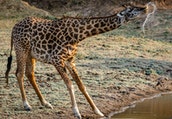- Africa Mosquitos Habitat: Mosquitoes inhabit a wide range of habitats in Africa, from urban areas to rural landscapes. They breed in stagnant water sources such as puddles, ponds, swamps, and even in containers that collect rainwater.
- Species Diversity:Disease Transmission Africa is home to numerous mosquito species, some of which are responsible for transmitting diseases to humans and animals.
- Disease Transmission: Disease Transmission: Mosquitoes are known vectors of several diseases that affect both humans and animals. In Africa, the most significant mosquito-borne diseases include:
- Malaria: Transmitted by the Anopheles mosquito, malaria is a severe and life-threatening disease that affects millions of people in Africa.
- Yellow Fever: Transmitted by the Aedes mosquito, yellow fever is a viral disease that can cause severe illness and, in some cases, death.
- Dengue Fever: Also transmitted by the Aedes mosquito, dengue fever can cause flu-like symptoms and, in severe cases, lead to dengue hemorrhagic fever or dengue shock syndrome.
- Zika Virus: The Aedes mosquito can also transmit the Zika virus, which can cause birth defects in babies born to infected mothers.
- West Nile Virus: The Culex mosquito is a common vector of the West Nile virus, which can cause fever and neurological symptoms.
- Prevention: Prevention: To protect against mosquito-borne diseases, it's essential to take preventive measures, such as using mosquito nets while sleeping, applying insect repellents, wearing long-sleeved clothing, and eliminating mosquito breeding sites around living areas.
- Impact on Wildlife: Impact on Wildlife: Mosquitoes also play a role in the ecology of Africa, serving as a food source for many insectivorous animals, birds, and bats.
- Research and Control: The mating season for Nyala usually occurs during the dry months. After a gestation period of around 220 days, a single calf is born, which is hidden in dense vegetation to protect it from predators.
- Climate Change Impact: Climate Change Impact: Climate change can influence mosquito populations and the spread of diseases. Warmer temperatures and altered rainfall patterns may impact mosquito breeding and disease transmission dynamics.
Africa Mosquitos
Mosquitoes are prevalent insects found throughout various regions of Africa. While they are tiny creatures, they play a significant role in the ecosystem and human health. Despite their small size, mosquitoes have a considerable impact on human and environmental health in Africa.
Africa Safari Tour Book online safari
Here are some key points about mosquitoes in Africa:
1. Mosquitoes Habitat
2. Africa Mosquitos Species Diversity
3. Africa Mosquitos Disease Transmission
4. Africa Mosquitos Prevention
5. Africa Mosquitos Impact on Wildlife
6. Africa Mosquitos Research and Control
7. Africa Mosquitos Climate Change Impact
Africa Mosquitos Safari Tour
When planning an Africa Mosquito Safari tour, it's essential to prioritize your health and take necessary precautions to prevent mosquito bites and protect against mosquito-borne diseases. While mosquitoes are prevalent in many African regions, there are ways to minimize the risks while enjoying a safe and memorable safari experience.
By planning ahead and choosing reputable safari operators or guides, to the rich diversity of African wildlife.
Here are some key points to consider:
Africa Destination and Season
Destination and Season: Research the specific safari destination you plan to visit and the prevailing mosquito-borne disease risks in that region. Different areas have varying levels of risk, and the intensity of mosquito activity can change with the seasons. For example, certain regions might have higher malaria transmission rates during the wet season.
Africa Consult a Travel Health Specialist
Consult a Travel Health Specialist: Before your safari, consult with a travel health specialist or visit a travel clinic for advice on vaccinations, preventive medications, and necessary precautions against mosquito-borne diseases. They can provide personalized recommendations based on your health status and travel itinerary.
Africa Visit Vaccinations and Medications
Vaccinations and Medications: Ensure that you are up-to-date on routine vaccinations and consider vaccinations or preventive medications for diseases like malaria and yellow fever, depending on your destination.
Africa Visit Mosquitos, Insect, Repellents
Insect Repellents: Bring effective insect repellents containing DEET, picaridin, or oil of lemon eucalyptus to apply on exposed skin and clothing. Follow the instructions on the product label.
Africa Mosquitos Protective Clothing
Protective Clothing: Wear long-sleeved shirts, long pants, and closed-toe shoes during outdoor activities, especially during the evenings and nights when mosquitoes are most active.
Africa Mosquito Nets
Mosquito Nets: Use insecticide-treated mosquito nets, particularly when sleeping in accommodations without proper screening or air conditioning.
Africa Mosquitos Avoid Stagnant Water
Avoid Stagnant Water: Mosquitoes breed in stagnant water, so try to avoid staying near stagnant water sources. In campgrounds or accommodations, ensure that they take appropriate measures to control mosquitoes.
Africa Mosquitos Seek Medical Attention
Seek Medical Attention: If you experience any flu-like symptoms or signs of mosquito-borne diseases, seek immediate medical attention and inform the healthcare provider of your recent travel history.
Africa Mosquitos Environmental Awareness
Environmental Awareness: Respect the local environment and avoid actions that might lead to an increase in mosquito populations, such as creating additional breeding sites.








 |
|  |
|  |
|  |
| 